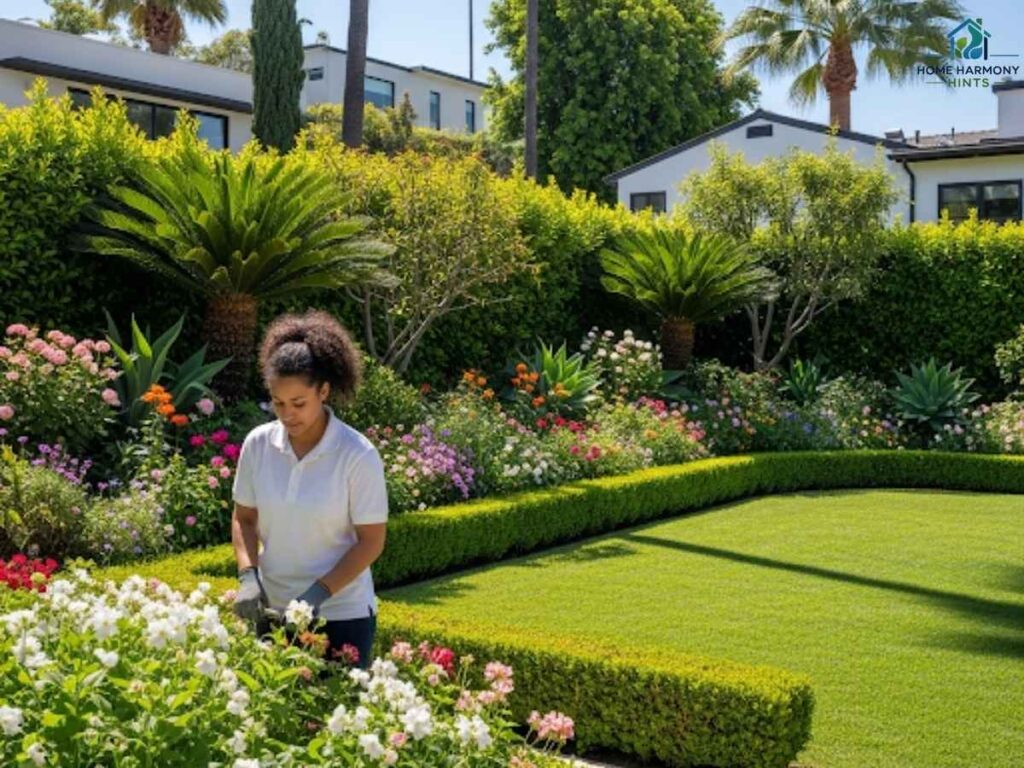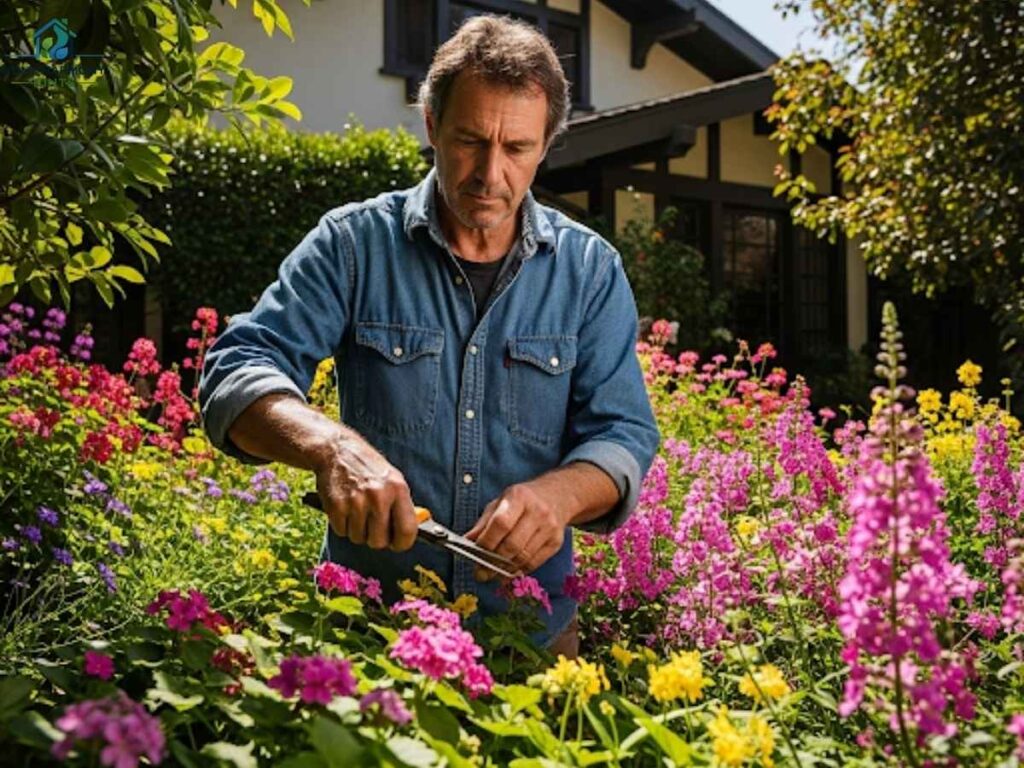Imagine strolling through Hancock Park on a sunny afternoon: neighbors out walking dogs, kids riding bikes, and colorful front gardens blooming all around. In Los Angeles, where outdoor living is a way of life, your garden isn’t just green space—it’s your home’s stage, an oasis, and sometimes a full-on neighborhood statement. Yet, in a city where climate, water restrictions, and microclimates collide, maintaining that garden can feel like another full-time job. If you’ve ever wondered whether to hire a professional gardener in Los Angeles—or how to find the best one in your neighborhood—this guide has your back.
Table of Contents
Why Professional Gardening Matters in Los Angeles
Unlike cities blessed with forgiving weather, Los Angeles presents unique gardening challenges. Our climate sees everything from intense summer heat, near-constant sunshine, and random drought cycles to the occasional winter rainstorm and yearly June Gloom. The average temperature hovers between 48°F and 85°F, with rare extremes—meaning plant selection, water management, and seasonal maintenance can’t be left to chance.

Urban density in areas like Koreatown and Echo Park limits soil access, while soil contamination from former industrial zones can make edible gardens tricky. Neighborhoods like Silver Lake and Mar Vista are full of steep slopes requiring erosion control or drought-smart landscaping. And throughout LA, water conservation is a must—with utility providers like LADWP setting strict guidelines for irrigation and landscaping.
Common Gardening Challenges in LA
- Water Restrictions—Seasonal water-use limits and drought-resistant requirements.
- Climate Extremes—Hot, arid summers; dry spells; and little winter chill.
- Soil Quality—Urban fill, compacted ground, or contaminant risks in some neighborhoods.
- Space Constraints—Small yards, hillside parcels, and multi-family units.
Local homeowners quickly realize pros know how to “speak” LA garden—combining plant science, resource awareness, and neighborhood trends.
Professional Solutions for Los Angeles Neighborhoods
Hiring a knowledgeable gardener isn’t just about pretty flowers. It’s about experience with local regulations, water wisdom, and climate savvy. Let’s look at how the right pro can transform outdoor spaces in specific Los Angeles communities.
Beverly Grove: Curated Elegance, Drought-Ready
Homeowners in 90036 routinely blend roses and boxwood with native succulents and smart drip irrigation. A resident may share:
“After moving from New York, we wanted an authentic English garden—until our water bill arrived! Hiring a gardener familiar with local codes, we swapped half our lawn for California natives and added a rain sensor to our irrigation. It stays elegant, costs less to maintain, and looks fresh year-round.”
Highland Park: Maximizing Small Urban Plots
In 90042, backyards are often compact and sunbaked. Local gardeners frequently recommend vertical gardens, raised beds, and water-wise edible plants. Consider this anecdote:
“Our first attempt at a home veggie patch ended in crispy lettuce. Our gardener brought in better soil, shade cloth, and split our plot into herbs and native pollinator plants. Now, even with just a 10’x10′ yard, we have salsa tomatoes and wildflowers!”
Venice: Eco-Friendly, Ocean-Close Landscapes
Venice’s coastal air and sandier soils create challenges for greenery and salt tolerance. Resident story:
“Salt spray and wind meant our favorite plants wouldn’t survive. A local gardening team rebuilt our front yard with dune grass, coast sagebrush, and succulents, mixing beauty and resilience. We even got a rebate through the city for removing turf!”
Local Neighborhoods: What Works Where
- Echo Park and Silver Lake:
Emphasis on native and low-water plants, terraced beds, and creative use of repurposed containers—think artistic curb appeal combined with real sustainability. - Brentwood and Pacific Palisades:
Homes with large lots often turn to pros for hedge maintenance, fruit tree care, and hillside stabilization—a must with shifting soils and rain events. - West Adams and Leimert Park:
Increasing popularity of community gardens and edible landscapes, requiring expertise in soil testing and raised-bed construction.
How Case Studies Highlight Success
Case Study 1: The Rain Garden Revolution in Atwater Village
Sarah, a busy Atwater Village resident, struggled with flooding on her sloped driveway every winter. Rather than simply patch the problem, her hired gardener created a rain garden channel with native sedges and rushes—slowing runoff, soaking up excess moisture, and attracting local birds. Within a year, the area stopped pooling water and bloomed with color.
Case Study 2: Drought-to-Delight in Sherman Oaks
The Chang family was tired of their brown, patchy lawn and sky-high utility bills. Their gardening service mapped out a plan—removing the turf, installing decomposed granite walkways, and planting drought-resistant sages, salvias, and agaves. Not only did garden maintenance time drop by half, but the space became a pollinator haven, drawing hummingbirds and butterflies.
Case Study 3: Urban Oasis in Pico-Union
Miguel rents in Pico-Union and wanted his triplex’s shared backyard to feel more welcoming. Budget was tight, but a professional gardener recommended container gardening, replaced weedy patches with mulch, and added a vertical herb wall. Their collaboration created a tidy green area that all tenants now use for cookouts and relaxation.
Meet the Top 3 Gardeners in Los Angeles
These trusted teams consistently serve diverse LA neighborhoods. Each profile includes client focus, specialties, and a direct website for easy contact.
1. Garden Works
Based in Beverly Hills but serving central and western LA, Garden Works offers comprehensive garden design, planting, and year-round maintenance. Their certified arborists focus on eco-friendly solutions like drip irrigation, native plant sourcing, and expert pruning for classic and modern landscapes. They’re licensed, bonded, and reliable for both one-time makeovers or ongoing care.
Website: bestgardenersinbeverlyhills.com

2. Pacific Gardens & Company
Well-known for bespoke, detail-oriented service, Pacific Gardens & Company brings horticultural expertise to each residential project. Their portfolio features creative plant choices, water-wise transformations, and expert garden restoration in neighborhoods from West LA to Pasadena. Perfect for discerning homeowners seeking a tailored garden plan and maintenance routine.
Website: bestgardenersinbeverlyhills.com
3. Lawn Love Lawn Care
With a tech-forward approach, Lawn Love delivers easy booking, satellite mapping for estimates, and satisfaction guarantees. They cover a wide swath of LA, offering mowing, weed control, fertilization, aeration, and more—great for busy families and property managers who want quick, transparent service.
Website: bestgardenersinbeverlyhills.com
Tip: Always verify gardener licensing and insurance for your ZIP code. Check online reviews and arrange a local walk-through before hiring.
Essential Tools and Local Resources
A garden in Los Angeles is only as healthy as the knowledge and tools behind it. Consider these resources to make your gardening journey easier and more rewarding:
- LADWP Water Conservation:
Get up-to-date drought rules, irrigation tips, and rebates for turf replacement.
Visit: ladwp.com - Los Angeles County Garden Permits:
If installing a new irrigation system or a large structure, check for local permit needs or garden guidelines.
Visit: lacounty.gov - Community Garden Projects & Support:
Connect with city-wide groups for community plots, volunteering, and advice, such as the Los Angeles Community Garden Council.
Visit: lagardencouncil.org - Water-Wise Gardening Advice:
Find plant lists, watering schedules, and climate adaptation tips at Water for LA.
Visit: waterforla.lacounty.gov - Neighborhood Associations:
Many LA neighborhoods have their own gardening clubs or online forums—ask neighbors for recommendations.
Smart Gardening in LA: Quick Tips
- Prioritize native and CA-friendly plants to support wildlife and reduce water use.
- Upgrade to drip irrigation and mulch heavily to cut evaporation.
- Test your soil for urban contaminants before planting veggies.
- Group plants by sunlight and water needs—front yards, shady corners, sunny patios.
- Embrace “lawn alternatives”—groundcovers, gravel, and even artful hardscaping.
People Also Ask: Common Los Angeles Gardening Questions
How do I maintain a lush garden during LA droughts?
Switch to drought-tolerant plants, install drip systems, and water early in the morning. Use mulch to lock in soil moisture and schedule watering days per LADWP rules.
What are some fast-growing privacy plants for Los Angeles yards?
Consider hedges like Pittosporum, privet, or clumping bamboo. Native toyon and coffeeberry work well as living fences with minimal water needs.
Do I need a permit to upgrade my irrigation in Los Angeles?
Most residential drip system upgrades don’t need major permits, but significant re-piping or connecting systems to public water lines may. Check with LADWP and LA County for current codes.
Frequently Asked Questions (FAQ)
What’s the average cost of hiring a professional gardener in Los Angeles?
Rates typically range from $50 to $150 per visit depending on garden size, frequency, and services. One-time makeovers or specialty care can cost more.
Which neighborhoods have the highest demand for gardening services?
Areas like Beverly Grove, Venice, Silver Lake, and Brentwood often see high demand, but nearly all LA neighborhoods value strong curb appeal and home gardens.
Can professional gardeners help with water conservation compliance?
Absolutely. Many LA gardeners specialize in installing efficient systems, using drought-tolerant plants, and guiding clients through local rebate programs.
What’s the best time of year to revamp your garden in LA?
Fall and early spring are perfect for planting, giving roots time to establish before heatwaves, and maximizing rainwater for new growth.
Are organic and native gardening methods popular in Los Angeles?
Yes—there’s strong interest in edible gardens, natives, and organic practices, often promoted by neighborhood associations and city initiatives.


